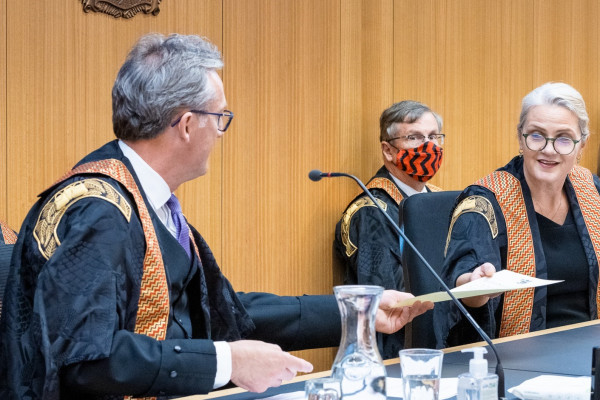Te Reo Māori in our courts
Te Reo Māori is an official language of Aotearoa New Zealand. Our courts use Te Reo Māori in court announcements, introductions, and during some court hearings. It is also a language used in ceremonies associated with our courts.
Why is it important that Te Reo Māori is used in our courts?
| |
In this video, made for Māori Language Week 2021, Justice Williams explains why it is important Te Reo Māori is used in our courts. Justice Williams' korero (6:23 min)
|
Court announcements and introductions
When a court hearing takes place the announcements about the judge entering the courtroom, the court taking a tea break or lunch break (an adjournment) and finishing for the day are in both Te Reo Māori and English.
The announcement for each type of court is different. Here is an example from the District Court.
Kia rite mō te kaiwhakawā o te Kōti-ā-Rohe, e tū koa
Silence for His Honour the District Court Judge, please stand
Kua tūwhera tēnei hui a te Kōti-ā-Rōhe ki te Whanganui-ā-Tara
This sitting of the Wellington District Court is now open
The judge might introduce themself in both Te Reo Māori and English, and lawyers often use both languages when they introduce themselves to the judge.
For some court hearings there might be a karakia (prayer) before the hearing. This is done to acknowledge that everyone in the courtroom has come together to find a way forward.
Speaking Te Reo Māori in court
The law states that people appearing in court are entitled to speak Te Reo Māori even if they are able to speak English or any other language.
However, the right to speak Māori does not entitle a person to insist on being answered in Māori.
Section 7 Right to speak Māori in legal proceedings
A person who wants to kōrero Te Reo Māori (speak in Māori) will need to comply with the court’s procedural rules.
The court will need to ensure there is a competent interpreter in the courtroom if Te Reo Māori is going to be used. The person wishing to speak Te Reo Māori needs to tell the court in advance that they wish to do so, and the court will arrange for an interpreter to be present. To do this a court form needs to be completed and sent or returned to the court at least 10 working days before the court case is going to be heard.
Speaking Te Reo Māori in Court - New Zealand Law Society
While there are some judges who speak Te Reo Māori when they are appointed others learn after their appointment. Understanding that it is important to learn the indigenous language.
Judge Carrie Wainwright is a Pākehā woman who is a passionate learner of Te Reo Māori. She talks about learning Te Reo Māori in this video (5:14 min). She is a Māori Land Court Judge.
 |
The Chief District Court Judge Heemi Taumaunu has stated in respect to the Rangitahi Courts (a type of Youth Court) that “It enhances respect for the rule of law when the law is speaking in the language of the people it is dealing with.” |
Ceremonies
Te Reo Māori also forms an important part of judicial ceremonies. Especially when a new judge is sworn in and welcomed by other judges.
 |
